|
|
|
Sort Order |
|
|
|
Items / Page
|
|
|
|
|
|
|
| Srl | Item |
| 1 |
ID:
084065


|
|
|
|
|
| Publication |
2008.
|
| Summary/Abstract |
This study examines the role played by GCHQ during the 1960s. It looks at GCHQ's overseas Sigint collection network, its relationship with the NSA and the problems caused by decolonization, economic crisis and military withdrawal from East of Suez. The paper also discusses GCHQ's intelligence targets in the 1960s, its codebreaking successes and assesses how important Sigint was for British policy towards France, Egypt and Indonesia. It concludes that while Sigint gave Britain tactical benefits in dealing with France and Egypt it was only in the case of Indonesia that Sigint helped Britain to achieve its strategic goals.
|
|
|
|
|
|
|
|
|
|
|
|
|
|
|
|
| 2 |
ID:
171232


|
|
|
|
|
| Summary/Abstract |
In May 2016, Britain’s signals intelligence agency the Government Communications Headquarters (GCHQ) joined the social media platform Twitter to considerable press fanfare. But to date, no analysis has been undertaken regarding the use and outcomes of social media by the agency - once referred to as Britain's 'most secret'. This article posits that, while the use of social media has allowed the agency to reach out to a new tech-savvy generation, its presence on the platform can sometimes stoke and amplify conspiracy theories affecting issues such as brand identity as GCHQ adopts a new, media friendly approach.
|
|
|
|
|
|
|
|
|
|
|
|
|
|
|
|
| 3 |
ID:
080867
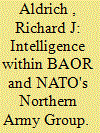

|
|
|
|
|
| Publication |
2008.
|
| Summary/Abstract |
During the Cold War the UK's principal military role was its commitment to the North Atlantic Treaty Organisation (NATO) through the British Army of the Rhine (BAOR), together with wartime command of NATO's Northern Army Group. The possibility of a surprise attack by the numerically superior Warsaw Pact forces ensured that great importance was attached to intelligence, warning and rapid mobilisation. As yet we know very little about the intelligence dimension of BAOR and its interface with NATO allies. This article attempts to address these neglected issues, ending with the impact of the 1973 Yom Kippur War upon NATO thinking about warning and surprise in the mid-1970s. It concludes that the arrangements made by Whitehall for support to BAOR from national assets during crisis or transition to war were - at best - improbable. Accordingly, over the years, BAOR developed its own unique assets in the realm of both intelligence collection and special operations in order to prepare for the possible outbreak of co
|
|
|
|
|
|
|
|
|
|
|
|
|
|
|
|
| 4 |
ID:
186365
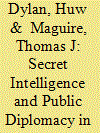

|
|
|
|
|
| Summary/Abstract |
Intelligence is generally collected and used in secret to inform internal audiences. Before and after Russia’s invasion of Ukraine, however, the UK and US governments have deployed intelligence extensively to influence external audiences, both publicly and privately, regarding Russian intentions, capabilities and practices, and the consequences of Russian actions. While the scale, manner and initially pre-emptive nature of these disclosures represent a significant evolutionary step in how liberal-democratic governments use their intelligence assets, current practice has built upon historical precedents. This article examines why states choose to use intelligence – including fabricated intelligence – for influencing external audiences; the different methods they deploy for doing so; the gains and costs of publicising intelligence; and how the use of intelligence during the Russia–Ukraine conflict should be understood within broader historical and contemporary trends. The authors conclude that while liberal democracies’ use of intelligence in public is to be welcomed for its greater transparency, careful risk management will be needed if this approach is to continue.
|
|
|
|
|
|
|
|
|
|
|
|
|
|
|
|
| 5 |
ID:
141299
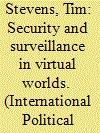

|
|
|
|
|
| Summary/Abstract |
Virtual worlds, persistent online spaces of social interaction and emergent gameplay, have hitherto been neglected in International Studies. Documents disclosed by Edward Snowden in December 2013 suggest that intelligence agencies, including the US National Security Agency and the British Government Communications Headquarters (GCHQ), have been less reticent in exploring and exploiting these environments for signals and human intelligence. This article introduces virtual worlds as sociological sites in the matrix of international politics and explores how the intelligence community (IC) has conducted operations in these environments, principally for counterterrorism purposes. Reconstructing the activities of the IC shows how virtual worlds have been drawn into the ambit of state surveillance practices, particularly as a means to generate intelligence from virtual-world behaviors that correlate with, and predict, “real-world” behaviors indicative of terrorism and other subversive activities. These intelligence activities portend a general colonization by the state of previously unregulated interstices of the sociotechnical Internet and their analysis contributes to our understanding of the relationship between government and the Internet in the early twenty-first century.
|
|
|
|
|
|
|
|
|
|
|
|
|
|
|
|
| 6 |
ID:
127721
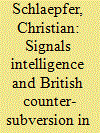

|
|
|
|
|
| Publication |
2014.
|
| Summary/Abstract |
This article is based on recently declassified Sigint reports on Eastern Europe produced by GCHQ and covering the years 1945 to 1950. This material allows historians to fill in an important gap in the current historiography, namely the virtual absence of Sigint in the discussion of post-war British policy. The significance of this material is not so much the actual content - much of it does not come as a great surprise to historians - but rather the extent to which it enabled the British government to almost immediately draw a precise and detailed picture of events behind the iron curtain and how this affected not only British foreign policy, but particularly domestic policy, in the field of counter-subversion.
|
|
|
|
|
|
|
|
|
|
|
|
|
|
|
|
| 7 |
ID:
148921
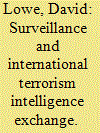

|
|
|
|
|
| Summary/Abstract |
Using the revelations Edward Snowden passed over to the press regarding the actions of the U.S.’s National Security Agency and the UK’s Government Communications Headquarters and their use of the Prism project, this article examines the law surrounding intelligence gathering in the U.S. and UK. Underpinning the analysis is the legal principle of proportionality as applied to balancing the interests of national security and individual liberties. After examining intelligence exchange procedures, which for the UK is through negotiated agreements between national security agencies and through the European Union’s policing agency, Europol, the main part of the article discusses legal challenges that have been made regarding surveillance and the use of anti-terror laws on citizens and the rationale behind the judicial decisions made in both the U.S. and UK jurisdictions. The argument forwarded is that there is a requirement for wide preventative powers being granted to counter-terrorism agencies and that the interests of national security and individual liberty are inclusive and, as shown by the cases covered in this article, we should rely on the judiciary to perform their function in applying proportionality to each case on its own merits.
|
|
|
|
|
|
|
|
|
|
|
|
|
|
|
|
|
|
|
|
|